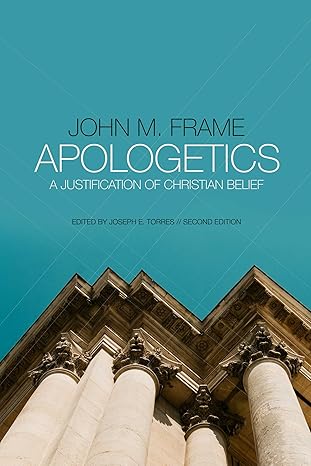Theologian John Frame is no stranger to our readers. Our first Author Interview here at Books At a Glance was featured John Frame and his then-new Systematic Theology, and it remains out front as the most visited page on our site. We interviewed him since then concerning his Selected Shorter Writings vol. 1 and vol. 2. We have great appreciation for his good ministry, and we are happy to have him with us yet again to talk about his new Apologetics: A Justification of Christian Belief.
Books At a Glance (Fred Zaspel):
Warm greetings, John. It’s always good to have you back with us. And congratulations on your new book!
First off, we see that this new title is actually an updated version of your earlier – and very popular – Apologetics to the Glory of God. In what way is this new book different from the original? In what ways has it been updated?
Frame:
 Nice to be with you again. Well, the new book has the same purpose as the old one, to serve as a basic introductory text for the field of apologetics. The revision hasn’t been drastic; most of the old text is still there. But there is a new chapter, on TAG, the transcendental argument for the existence of God. The previous edition discussed some of the issues surrounding TAG, but it did not focus on that terminology and the controversy that has emerged in the last twenty years over what “transcendental” really means.
Nice to be with you again. Well, the new book has the same purpose as the old one, to serve as a basic introductory text for the field of apologetics. The revision hasn’t been drastic; most of the old text is still there. But there is a new chapter, on TAG, the transcendental argument for the existence of God. The previous edition discussed some of the issues surrounding TAG, but it did not focus on that terminology and the controversy that has emerged in the last twenty years over what “transcendental” really means.
There is a very valuable new Foreword by Vern Poythress, who has worked very closely with me in bringing apologetics, philosophy, and other disciplines under the authority of God’s word.
As an appendix there is my article “Epistemological Perspectives and Evangelical Apologetics,” which I’m especially happy to see again. I wrote it back in the early 1980s in the hopes of bringing together the concerns of the different apologetic methods. As it turned out, it didn’t have that result, but I’m happy that here it has another chance. I present my apologetic method in this essay without buzzwords and polemics.
There’s also my essay on the implications of God’s aseity, his self-contained character, for apologetics. And there are some valuable contributions by Joe Torres.
We’ve also added an “Apologetics Glossary” that I believe will be helpful to many readers. People who begin to read in this field often get tripped up by its technical vocabulary, so I have tried to provide some basics on terminology.
Books At a Glance:
What role did Joseph Torres have in this new edition?
Frame:
Joe explains his role in his new Introduction. He made a few changes in the order of things and integrated the TAG chapter (see above) into the body of the book. He also contributed some explanatory notes and a couple of valuable Appendices on Fideism and Circularity.
Books At a Glance:
Very simply, what is the goal of apologetics? Is it primarily defensive, offensive – or, as Warfield argued, a constructive enterprise? All of the above?
Frame:
All of the above. You can’t formulate the best defense unless you undermine the ideas that generate objections; so defense requires offense. But a good offense sometimes provokes still more objections; so offense requires defense. And both presuppose what Warfield calls “construction” and what I call “proof:” a basic rationale for believing the Gospel. And to make your proof really credible, you need to engage in defense and offense. So “proof,” “defense,” and “offense” all involve one another. Each is a “perspective” on the whole work of apologetics.
Books At a Glance:
What is distinctive about Van Til’s apologetics? And what is distinctive about your own “brand” (if I can call it that) of Van Tillian apologetics?
Frame:
Van Til said that apologetics is the same as anything else in the Christian life: it is something to be done to the glory of God. So as Peter says (1 Pet. 3:15) when we do apologetics we must “set apart Christ as Lord.” Some apologists give the impression that when we reason with an unbeliever we should set our faith aside, so as to pretend neutrality. But we can never be neutral. We are disciples of Jesus. And he must control our reasoning, even when we reason with unbelievers. So in apologetics as in all of life, we are called to “presuppose” God and the truth of his word.
Books At a Glance:
Tell us about your own interest in this field of study. How did it begin? And what have been the major influences along the way?
Frame:
While attending a secular college, I was often confronted with challenges to my faith. I sought help and found it, from Christian friends, from C. S. Lewis, and eventually from Van Til. The apologetic literature fascinated me, and I sensed that God was calling me to sharpen and strengthen the argument between the gospel and the “wisdom of the world.”
Books At a Glance:
Christians are often interested in apologetics – we enjoy seeing that our faith is indeed grounded in truth, and we always enjoy seeing it vindicated in every way. But it seems that Christians seldom feel adequate themselves to, as you put it, “take it to the streets.” What encouragement might you give in this regard? How does your book seek to help? And who is your intended audience?
Frame:
I’m writing for believers with some level of college or graduate education, but some high schoolers may find it useful. There is some technical discussion in the book, but also a dialogue of how one might witness to a stranger on a plane. I do want to encourage fellow apologists to take their apologetics to the streets in conversations with real nonbelievers, and I hope this book will give them some help in doing this.
Buy the books

APOLOGETICS: A JUSTIFICATION OF CHRISTIAN BELIEF
